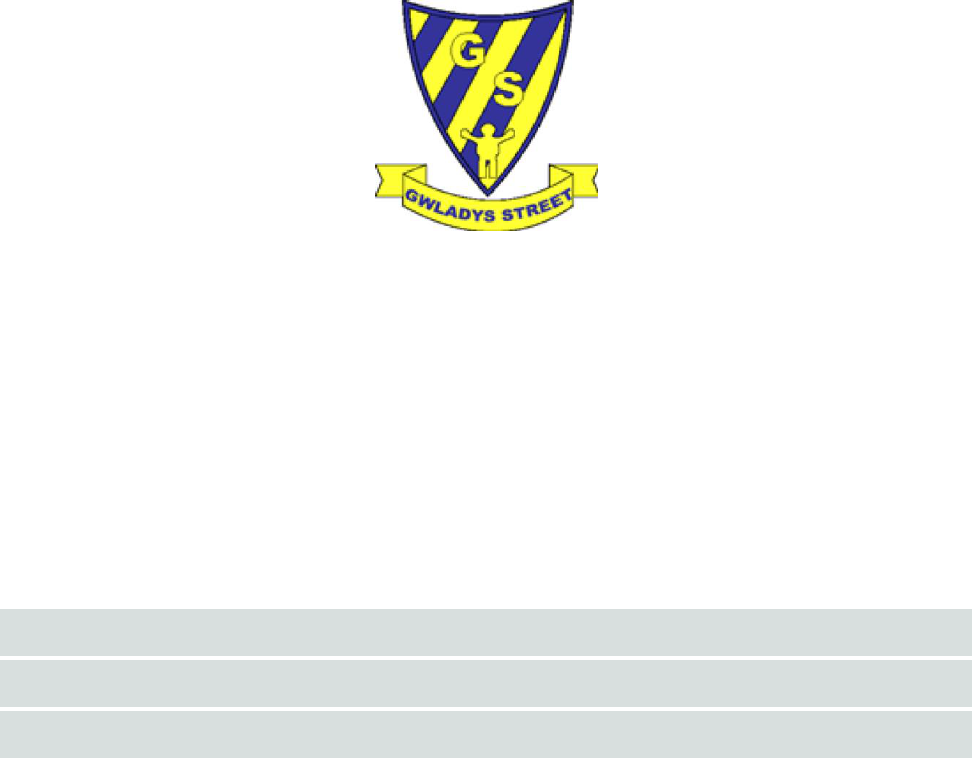
Gwladys Street Primary and Nursery
School
Early Years Foundation Stage (EYFS)
policy
Golden Opportunities for Achievement
and Learning
Approved by:
Date:
Last reviewed on:
Next review due by:

Contents
1. Aims
2. Legislation
3. Structure of the EYFS
4. Curriculum
5. Intent
6. Implementation……………………………………………………………………………………………………..
7. Impact………………………………………………………………………………………………………………..
6. Working with parents
7. Safeguarding and welfare procedures
8.Transition and working with parents as partners.……………………………………………...........................
9. Parents as partners………………………………………………………………………………………………...
10. Monitoring arrangements
1
.Aims
School Aims:
We want our school to be one:-
1. Where everyone has access to an engaging, creative and challenging curriculum that promotes a love
of learning.
2. Where everyone feels safe, happy and secure in our learning community.
3. Where everyone works in partnership with the wider school community.
4. Where Golden Opportunities are provided in an Inclusive Setting.
5. Where everyone respects each other and works as a team to achieve our GOALS.
6. Where children develop lively, enquiring minds, self-confidence and independence.
7. Where a healthy lifestyle and positive, spiritual and moral values are promoted.
We believe that children learn best in a happy, safe and caring environment and that it is the responsibility of
all staff, pupils, parents and governors to promote this ethos.
We demonstrate our commitment to the inclusion of all pupils by increasing the participation of children within
the community and the school curriculum and continually seek to raise the standards of education for all within
a culture that delights in celebrating individual achievement.
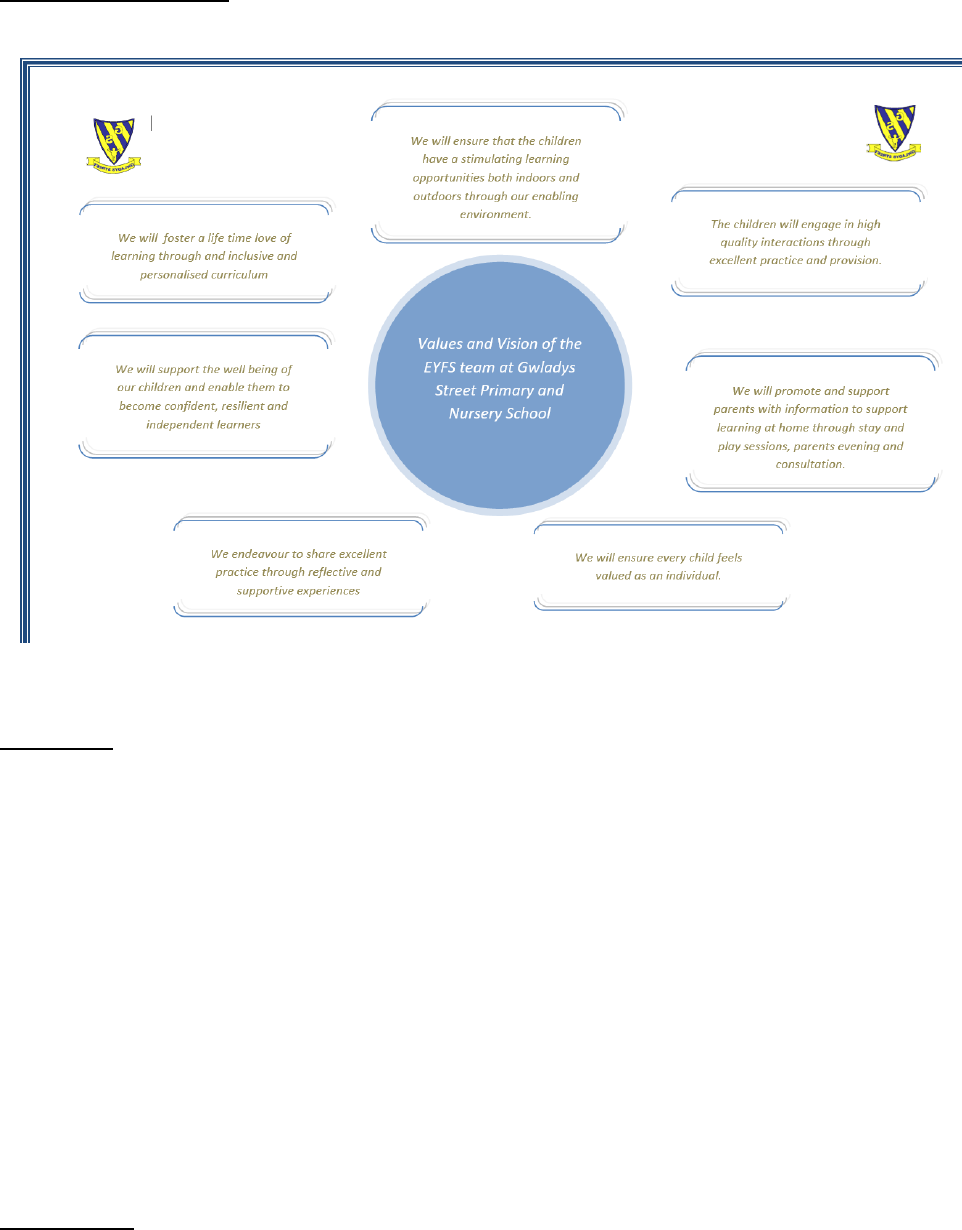
EYFS Values and Vision
“Play is the work of the child.” Maria Montessori
EYFS Aims:
At Gwladys Street Primary and Nursery school we ensure that children access a broad and balanced EYFS
curriculum that gives them a wide range of knowledge and skills needed to ensure good or better progress
and equipping them with the skills to support them in future, enabling them to become successful lifelong
learners.
We will achieve our aims through:
● quality and consistency (in all early years settings) so that every child makes good progress and no
child gets left behind
● a secure foundation through learning and development opportunities which are planned around the
needs and interests of each individual child and are assessed and reviewed regularly
● partnership working between practitioners and with parents and/or carers
● equality of opportunity and anti-discriminatory practice, ensuring that every child is included and
supported
(Statutory Framework for the Early Years Foundation Stage April 2017)
2. Legislation:
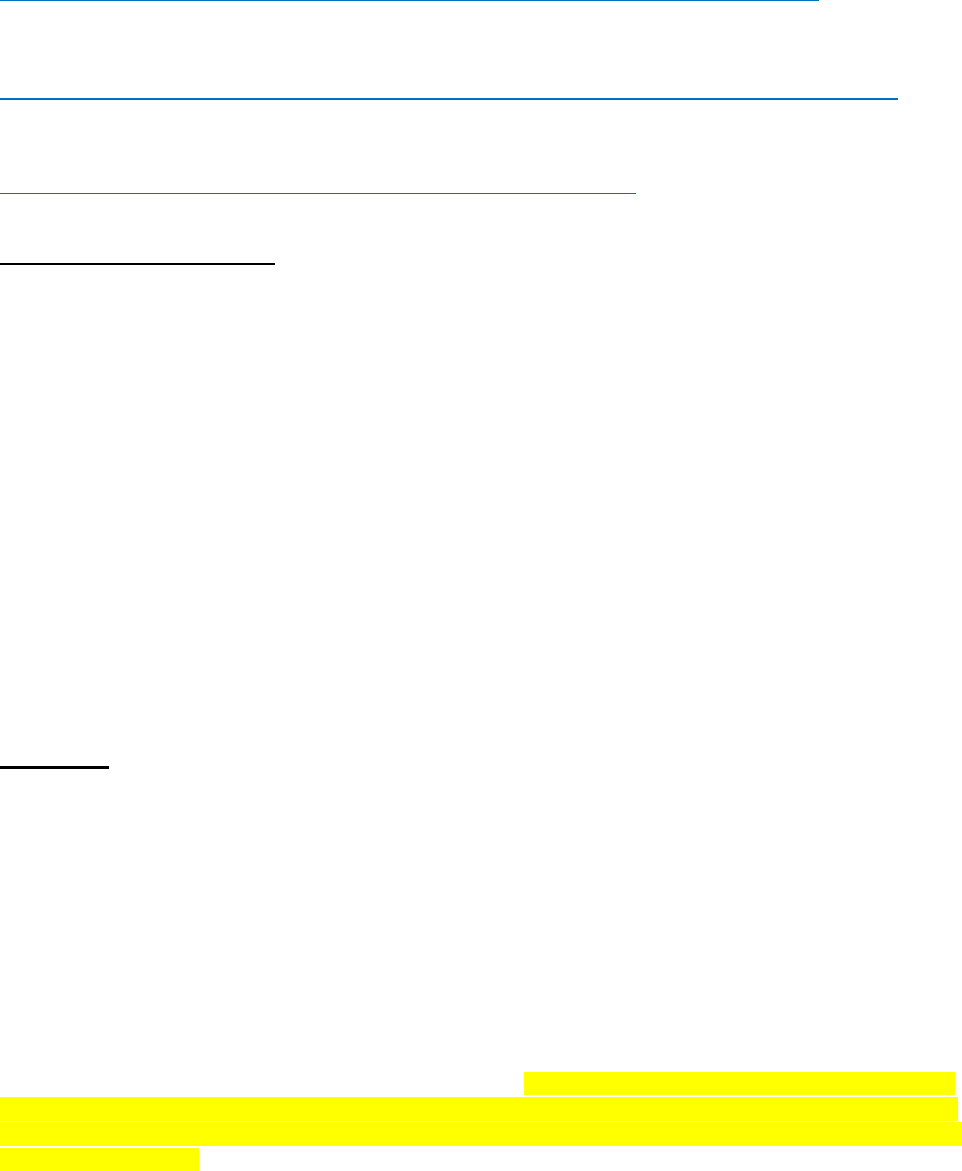
1. Early Years Outcomes (A non-statutory guide for practitioners and inspectors to help inform understanding
of child development through the early years September 2013)
https://www.foundationyears.org.uk/wp-content/uploads/2012/03/Early_Years_Outcomes.pdf
2. Development Matters in the Early Years Foundation Stage (EYFS)
https://www.foundationyears.org.uk/files/2012/03/Development-Matters-FINAL-PRINT-AMENDED.pdf
3. Statutory framework for the Early Years Foundation Stage Setting the standards for learning, development
and care for children from birth to five April 2017
2017 statutory framework for the Early Years Foundation Stage (EYFS).
3. Structure of the EYFS day:
Foundation Stage 1 (Nursery)
Opening Time: 8.30am
Lunchtime collection: 11.30am
Afternoon Sessions 12.30pm
Closing Time: 3.30pm
At Gwladys Street Primary and Nursery School we offer 15 hours a week free childcare for all 3 to 4 year olds.
We do offer additional hours. For more information regarding this, please speak to the school office.
Foundation Stage 2 (Reception)
Opening time 8.50am
Closing time 3.30pm
Attendance
Attendance within EYFS is addressed in line with the whole school approach to improving and maintaining
good attendance. At Gwladys Street Community Primary and Nursery School, we believe that teaching the
children the importance of being at school on time and attending school is vital to ensure children grow up
with a positive attitude towards Education.
All children are actively encouraged to arrive at school on time daily. Children self-register upon arrival and a
formal register is taken. Attendance figures for both Foundation Stage one and two are fed into the whole
school attendance data and children with 97% or above attendance receive a reward. (See whole School
Attendance Policy). The school does not authorise any holidays taken during school time. We advise that any
medical appointments are made out of school hours so learning is not affected. All EYFS teachers discuss
attendance each day with their class, Foundation Stage two teachers talk about attendance assembly
attendance each Friday and celebrate successes. Staff have regular discussions with parents about
attendance and record any reasons for absence on SIMS. In addition to this teachers send letters to support
reasons for absence and reinforce the importance of punctuality and attendance and the impact that this has
upon teaching, learning attainment and progress. Attendance is also discussed throughout the year at parent
consultation meetings.

4. Curriculum:
Our early years setting follows the curriculum as outlined in the 2017 statutory framework of the EYFS.
The EYFS is based upon four overarching principles:
∙ Every child is a unique child, who is constantly learning and can be resilient, capable, confident and self-
assured;
∙ Children learn to be strong and independent through positive relationships;
∙ Children learn and develop well in enabling environments, in which their experiences respond to their
individual needs and there is a strong partnership between practitioners and parents and/or carers;
∙ Children develop and learn in different ways and at different rates.
At Gwladys Street Primary and Nursery school these four principles shape our practice and are fundamentally
linked to the characteristics of effective learning in development matters. We understand how children develop
and learn in the context of the relationships and environments formed around them. We understand that the
characteristics are how children are driven to reach out to the world around them and that these are individual
to each child and will look different depending upon the age of the children. The characteristics focus upon
how a child learns. As part of our curriculum we support children to develop the characteristics of effective
teaching and learning.
These are;
• Playing and exploring - children investigate and experience things, and ‘have a go’;
• Active learning - children concentrate and keep on trying if they encounter difficulties, and enjoy
achievements;
• Creative and thinking critically - children have and develop their own ideas, make links between ideas, and
develop strategies for doing things.
The EYFS framework includes 7 areas of learning and development
The prime areas are:
● Communication and language
● Physical development
● Personal, social and emotional development
The prime areas are strengthened and applied through 4 specific areas:
● Literacy
● Mathematics
● Understanding the world
● Expressive arts and design
At Gwladys Street Nursery and Primary School we recognise that children learn and develop in different ways
and at different rates. Our curriculum is responsive and holistic and we value all areas of learning. We
understand the importance of Prime areas being time specific and personal, social and emotional
development, communication and language and physical development are highly regarded and supported
with a heavy emphasis upon these areas of learning particularly within Autumn Term. Each area of learning
and development is implemented through planned, purposeful play, and through a mix of adult directed, adult-
led and child-initiated activities. Practitioners respond to each child’s emerging needs and interests, guiding
their development through warm, positive interactions. As children grow older, and as their development
allows, the balance gradually shifts towards more adult directed activities to help children prepare for more
formal learning, ready for year 1.
5. Gwladys Street Primary School EYFS Intent
At Gwladys Street Primary and Nursery School we would like children to develop a life time love of learning
through effective relationships and a stimulating and effective learning environment. We would like children to

have acquired and developed skills in all areas of learning to enable them to reach ELG ensuring that they are
year one ready enabling them to successfully access National Curriculum.
We will to do this by:
● Providing a challenging and stimulating learning environment which takes account of children’s
individual interests.
● Being skilled practitioners carefully observing, understanding what a child is doing, learning and
moving learning forwards.
● Providing high quality interactions which support and develop children’s natural curiosity and desire to
explore and make sense of the world around them.
● Asking a range of questions which support children to problem solve and find out answers to their
own questions.
● Support and extend vocabulary and model new vocabulary effectively and in context through learning
opportunities.
● Build upon prior knowledge and experiences.
● Providing high quality teaching and learning both indoors and outdoors.
● Providing the maximum amount of outdoor learning opportunities for children.
6. EYFS Implementation
We will implement our EYFS curriculum by…
● Supporting and developing the Characteristics of effective learning and the scales of well-being and
involvement.
● Through a balance of adult directed whole group teaching sessions, adult led small group activities
and by following children’s interests, child initiated activities which are open ended and self-chosen.
● Children will be supported to extend their knowledge and understanding through high quality
interactions, knowing more and remembering more.
● Classroom resources and enhancements will be organised to ensure progress and challenge.
Enhancements will link to a theme or a fascination but will evolve over a term allowing the children to steer
their own learning improving levels of engagement, motivation and improving and impacting upon behaviour.
● Teaching will support the learning process, not product.
● Focused and personalised planning systems are responsive and enable us to identify next steps
immediately for individual children. These moments will often be unplanned spontaneous moments starting
from the child. Focus planning will be revisited with the children supporting them to understand and remember
their learning. Children will contribute to their learning and their ‘voice’ is added to their personalised plans.
● Valuing the importance of outdoor play and the thinking that arises from high quality sensory
experiences. Good habits begin when children are young and we strive to develop healthy habits and positive
attitudes to our bodies whilst being active. ‘Every child (is) a mover’, we know and understand that children
will develop better gross and fine motor skills outdoors and that these skills are needed to become competent
readers and writers. We understand that good gross motor development is critical for good fine motor
development. We are aware of the impact that proprioception and vestibular learning has upon attention,
memory and learning through brain and body connection. We value the importance of outdoors and the
impact that this has upon mental health and well-being for both children and adults alike. At Gwladys Street
we ensure that our children will be provided with opportunities to access outdoor learning each morning and
afternoon for the maximum amount of time possible.
Planning
At Gwladys Street Primary and Nursery School we use data, consultation with children, information from
parents, observations, events, festivals, seasons and an overarching theme is taken from prospectus in order
to inform or planning starting points. Our starting points feed into our continuous provision planning systems.
This planning evolves over a term, enabling us to personalise planning for individual and groups of children.
Data is carefully used to feed into focused planning systems to ensure maximum progress. Focused plans
build up a picture of a child’s Learning Journey. Wow moments are also recorded and best fit judgements are
made alongside evidence collected. Within Foundation Stage 2 weekly records are collated for Literacy and

Mathematics activities. Both Foundation Stage one and two use floor books to record and revisit learning and
there is a strong emphasis upon child development and practitioner knowledge of the child.
In Foundation Stage One children will participate in 2 short adult directed group time inputs per morning and
afternoon session and adult led activities and provocations are set up in response to a child or children’s
interests. Practitioners will carefully follow children’s interests. Children in Foundation Stage One will have
large periods of access to both indoor and outdoor provision and long periods of uninterrupted play. All
learning within continuous provision will be predominantly adult led or child initiated, adults are effective and
responsive and follow children carefully supporting and extending learning throughout interactions and play.
All children are allocated a key person, this will depend on the length of time they have spent within the setting
and their individual needs, these smaller groups will be organised to ensure progress and maximum impact.
To support children’s proprioception and vestibular learning children take part in daily activities to support and
develop these skills.
In Foundation Stage Two children will participate in 3 short adult directed group time sessions in the morning
and 2 in the afternoon. All children will have access to outdoor provision once per morning. Afternoon
sessions consist of free flow when children can play either indoors, outdoors and in either Foundation Stage
base. Foundation Stage Two children will have long periods of uninterrupted play. All play within continuous
provision will be predominantly adult led or child initiated, adults follow children, adult directed teaching will
also take place when groups of children are supported to take part in a learning activity. All children within
Foundation Stage 2 will be allocated a key person dependent upon their needs, children are grouped for
Literacy and Phonics in Mathematics children are allocated a more able partner. A small Mathematics group
takes place for children with specific learning needs alongside weekly active Math’s sessions. As in
Foundation Stage One children in Foundation Stage Two are grouped to ensure and enable children to make
accelerated progress in these areas. To support children’s proprioception and vestibular learning children take
part in interventions to support and develop these skills. Children with English as an additional language are
provided extra support within continuous provision where practitioners skillfully extend language. In addition to
this our school specialist supports these children again, within continuous provision.
In planning and guiding children’s activities, practitioners reflect upon the different ways that children learn
and include these in their practice. Interventions are rapidly put in place to ensure progress using knowledge
of the child and careful data collections and tracking systems. At Gwladys street we value the importance of
early intervention and where a child may have a special educational need or disability, staff consider whether
specialist support is required, linking with relevant services from other agencies and seeking advice from the
SENDCO where appropriate.
Outdoor Learning: We value the importance of outdoor learning and appreciate the unique characteristics,
features and experiences it provides. At Gwladys Street Primary and Nursery School outdoor learning has
equal value to indoor learning and we fully understand the positive impact on children’s well-being and
development. Children have the support of attentive and engaged adults who are enthusiastic about the
outdoors and understand the importance of outdoor learning. Outdoor learning is enhanced by an
environment that is richly resourced with play materials that can be adapted and used in different ways. We
thrive to ensure that outdoor learning considers experiences rather than equipment and again places children
at the centre of the provision.
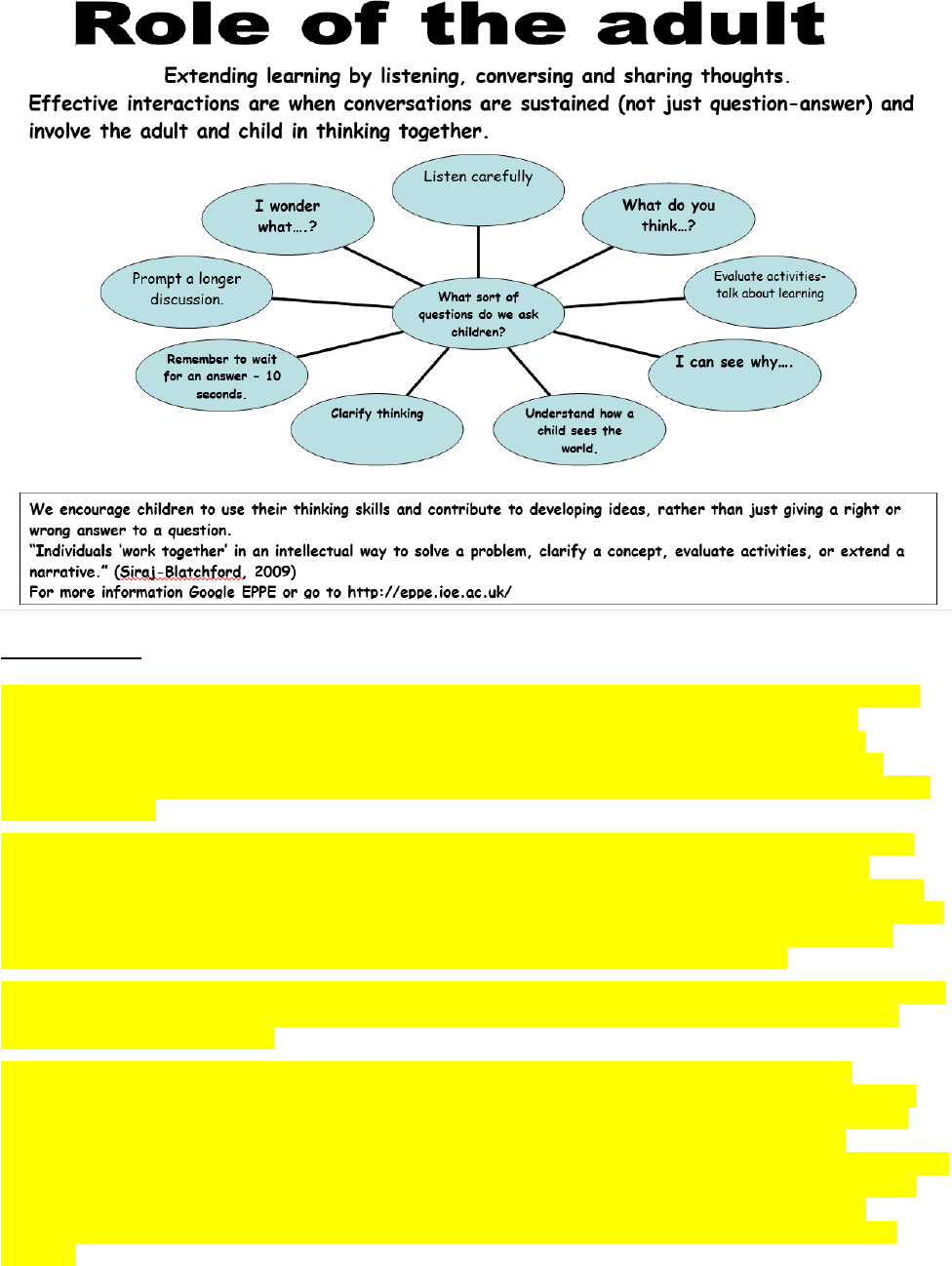
7. EYFS Impact
At Gwladys Street Primary School we ensure that children make good or better progress from their starting
points, that our children are happy and ultimately successful. We support children to develop strong
characteristics of effective learning in order to become effective lifelong learners. We will ensure that
children’s Leuven scales of well-being and involvement will continue to improve throughout their EYFS
learning journey and this is closely monitored as we know and understand the impact this has upon learning
and development.
At Gwladys Street Primary and Nursery School the EYFS team carefully plan for children considering their
individual needs, interests, curriculum and theme. They closely observe children and record how that
individual has been supported within their learning environment, enhancing immediately, when appropriate.
Staff hold regular planning meetings to discuss progress and provision, moderating children’s learning. These
meetings enable the team to develop further professionally through our peer to peer support systems to
support children’s learning further and to continue to develop personally and professionally.
On entry to Foundation Stage staff will complete a baseline assessment of children collating observations and
assessments. On entry to Foundation Stage 2 the NFER baseline is completed in addition to practitioner
observations and assessments.
Staff carefully track all areas of learning through our Otrack system termly, in addition to this termly
Mathematics assessment and Writing assessment are completed, Foundation Stage 1 complete a reading
assessment alongside our Reading Framework to ensure coverage of skills alongside phonics this is also
used for external children on entry to Foundation Stage 2 enabling us to quickly plug gaps and put
interventions in place to support development of skills enabling them to access RWI more quickly and improve
reading and comprehension skills overall. We also track the characteristics of effective learning termly and
use the Leuven scales of well-being and development as part of our focus planning assessment. We
thoroughly value the importance of children’s wellbeing and the impact this can have upon progress and
learning.
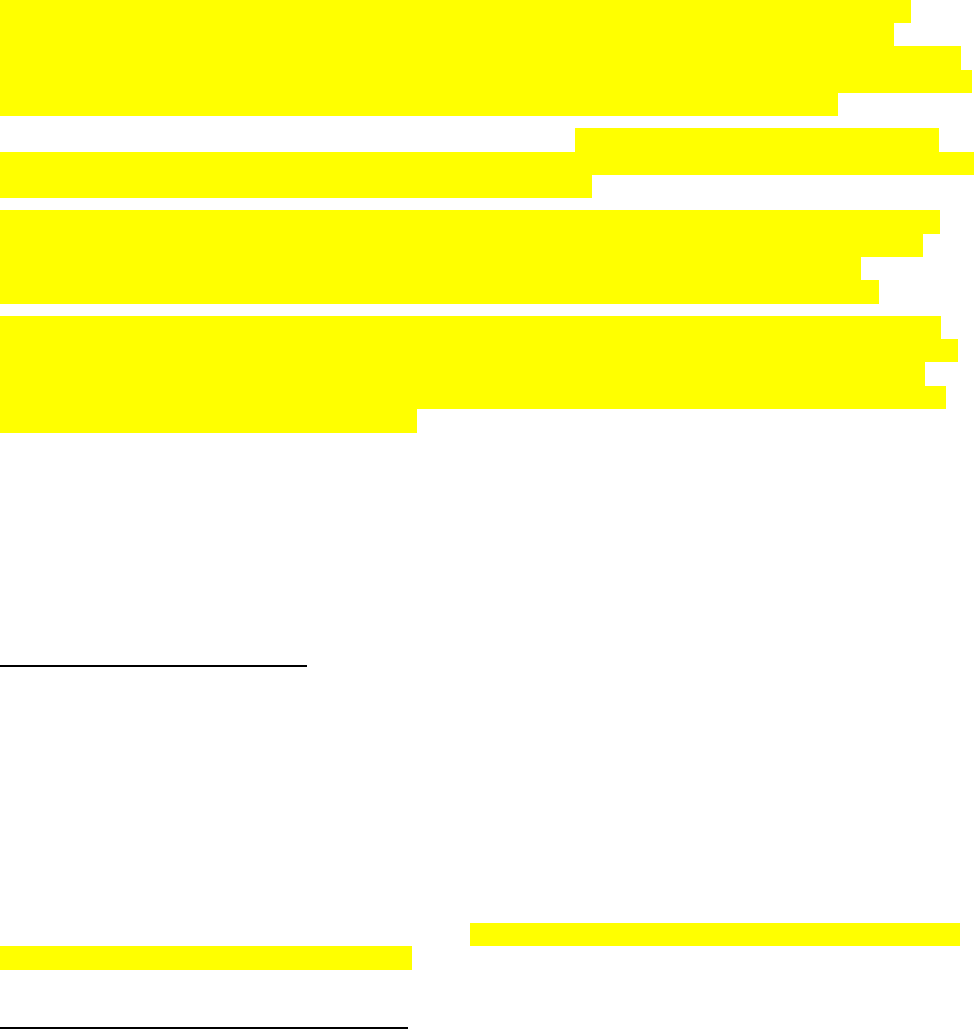
Learning Journey displays are updated termly and these are fed into floor books. These floor books are
discussed and shared with children to support them to know and remember more about their learning
process. We talk about what we can remember, what we did and how we changed things to make something
better. Children’s focused plans are also shared with them giving them ownership of their learning and helping
us to understand what learning they have enjoyed and the skills they have developed and why.
Regular progress meetings take place with the Head teacher and individual data is used to inform a child’s
next steps as part of their focused planning week. In addition to this data is used to inform interventions, which
are altered depending upon the cohorts needs, to ensure progress.
At Gwladys Street Primary and Nursery School, ongoing assessment is an integral part of the learning and
development processes. Staff observe pupils to identify their level of achievement, interests and learning
styles. These observations are used to shape future planning. Practitioners also take into account
observations and conversations shared by parents and/or carers to form starting points for learning.
When a child is aged between 3 and 4, practitioners baseline the children and share a ‘Beginning to Learn’
document to inform parents how their child has settled into school life and their progress so far. This will also
identify ways to support their children’s learning at home. If in their pre-school year children will receive a
detailed report at the end of the academic year informing parents of attainment, progress and future targets
and next steps for the following academic year.
At the end of the EYFS, staff complete the EYFS profile for each child. Pupils are assessed against the 17
early learning goals, indicating whether they are:
● Meeting expected levels of development
● Exceeding expected levels or,
● Not yet reaching expected levels (‘emerging’)
Again a detailed and personal report is written for each child informing parents of attainment, progress, future
targets and next steps for the academic year.
Positive Behaviour Management
At Gwladys Street Primary and Nursery school we place emphasis on self-responsibility and caring for others;
Kind Hands, Kind Words, Walking Feet, Listening Ears, Looking Eyes and being ready to learn at school. We
support children to talk about how they are feeling and help them to understand their feelings and emotions.
We have clear and consistent strategies in place and enjoy celebrating our successes. Each day the children
begin school on the ‘sunshine’ when children behave well they are placed on to the class ‘rainbow’ and their
efforts are celebrated. When a child behaves poorly they will receive a warning, if they persist they will be
given time-out for 3 minutes and they will be moved into the rain cloud. They will return to the sunshine if they
make extra effort for the rest of the session. If a child continues to behave poorly and receives more than two
time out periods they will be placed on the Thunder cloud, they will be taken to a senior member of staff for
behaviour support and this will be discussed when you collect them. If the poor behaviour act is serious then
they will be taken to the head teacher. We believe in a partnership between home and school and by working
together in this way we will benefit all of the children. As part of our curriculum we also use our school ROAR
system to talk about our feelings and emotions and we follow Jigsaw to support personal, social, emotional
development.
Inclusion/Special Educational Needs (SEN)
All children and their families are valued at Gwladys Street Community Nursery and Primary School. Children
are treated as individuals and have equal access to all provisions available. All children are encouraged to
achieve their personal best and planning is adapted to meet the needs of all groups and abilities.
Assessments take into account contributions from a range of perspectives to ensure that any child with
potential SEND is identified at the earliest possible opportunity. Early identification of additional needs is
crucial to enable staff to support the development of each child. During initial meetings with Key workers,
Parents/Carers share relevant information that will be shared with the SENDCO to support any application for
additional support or advice from outside agencies. Additional information is also collected from the child’s
previous setting. Concerns are always discussed with parents/carers at an early stage and the schools
SENDCO is called upon for further information and advice. Appropriate steps are taken in accordance with the
school’s Inclusion policy for SEND. If speech and language support is needed, the class teacher will discuss
this with our Speech Therapy therapist and support and advice will be given with the permission of the child’s
parents/ carers. To support a child’s emotional needs it may be that they would benefit from sessions with the

learning mentors which again would be discussed with parents/carers. We meet the needs of all our children
through:
∙ planning opportunities that build upon and extend children’s knowledge, experience and interests, and
develop their self-esteem and confidence;
∙ using a wide range of teaching strategies based on children’s learning needs;
∙ providing a wide range of opportunities to motivate and support children and to help them to learn effectively;
∙ providing a safe and supportive learning environment in which the contribution of all children is valued;
∙ using resources which reflect diversity and are free from discrimination and stereotyping;
∙ planning challenging activities for children whose ability and understanding are in advance of their language
and communication skills.
8. Transition and working with parents as partners
At Gwladys Street Primary and Nursery School we recognise that children learn and develop best when there
is a strong partnership between practitioners and parents and/or carers. Within EYFS each child is assigned a
key person who helps to ensure that their learning and care is tailored to meet their child’s needs. The key
person supports parents and/or carers in guiding their child’s development at home. The class teacher works
alongside the key person and helps families to engage with more specialist support, if appropriate.
We pride ourselves upon the positive relationships that we build and we recognise that children learn to be
confident and independent through the development of secure and caring relationships. We recognise the
important role parents and/or carers play in educating the children and we foster these relationships through:
● Home visits: Meeting with children and families prior to them attending school.
● Inviting the children who do not attend our school nursery to spend time with their teacher in the
learning environment before starting at school.
● Supporting children with the transition from Foundation One to Foundation Two by enabling children
to spend time in the last half term in the new environment. This is also supported by the shared, free flow
outdoor learning environment.
● Inviting all parents to an induction meeting during the term before their child starts school.
● Encouraging parents to attend parents meetings in the first two terms to discuss their child’s progress.
● Providing parents with a written report on their child’s attainment and progress at the end of each
school year.
● Encouraging parents to contribute observations.
● Sharing our approach to reading and mathematics teaching through stay and play sessions.
● Links with other providers to discuss pupils who did not attend school nursery.
● Inviting parents in to stay and play sessions, workshops and celebrations.
● Providing a quiet space where parents feel comfortable to discuss concerns or issues.
Year 1 teachers meet with the Reception teachers to discuss each child and are given a copy of the Otrack
data report together with a short commentary on each child’s skills and abilities linking to the characteristics of
effective learning. This informs the dialogue between Reception and Year 1 teachers about each child’s stage
of development and learning needs and assists with the planning of activities in Year 1.
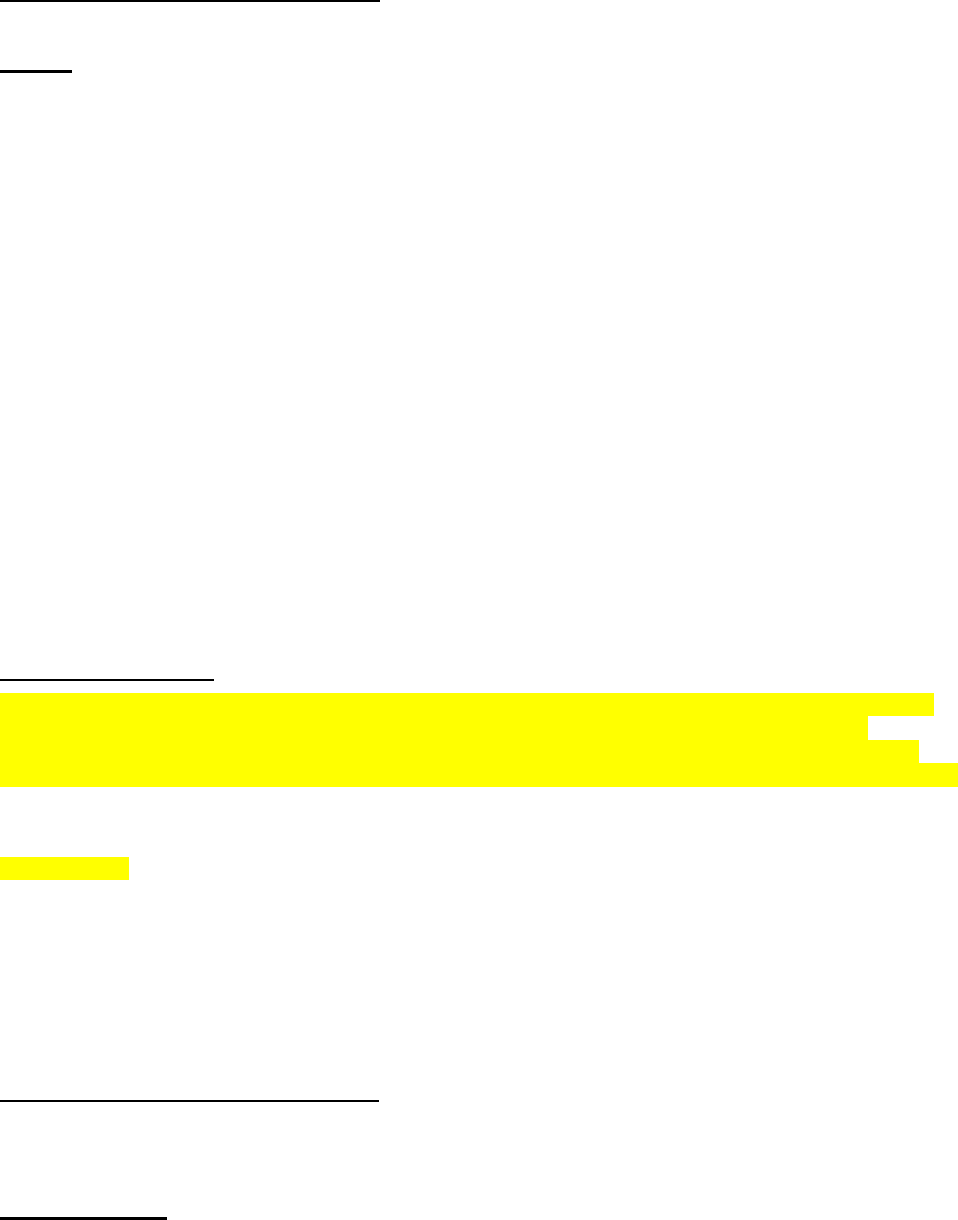
7. Safeguarding and welfare procedures
Our safeguarding and welfare procedures are outlined in our safeguarding policy.
Welfare
It is vital that all children in the school are safe. We ensure that safe messages is at the centre of our
curriculum. We provide children with opportunities to help them develop the skills they need to keep
themselves safe. Children should be allowed to take risks, but need to be taught how to recognise and avoid
hazards both in the real and virtual world. To support children further we follow the JIGSAW PHSE
programme for Early Years. We aim to protect the well-being of all children. (See Whole School Safeguarding
Children Policy)
“Children learn best when they are healthy, safe and secure, when their individual needs are met and when
they have positive relationships with the adults caring for them.”
At Gwladys Street Community Primary and Nursery School we understand that we are legally required to
comply with certain welfare requirements as stated in the Statutory Framework for Early Years Foundation
Stage 2017. We understand that we are required to: Promote the welfare and safeguarding of children.
Promote good health, preventing the spread of infection and taking appropriate action when children are ill.
Manage behaviour effectively in a manner appropriate for the children’s stage of development and individual
needs. Ensure all adults who look after the children or who have unsupervised access to them are suitable to
do so. Ensure that the premises, furniture and equipment is safe and suitable for purpose Ensure that every
child receives enjoyable and challenging learning and development experiences tailored to meet their needs.
Maintain records, policies and procedures required for safe efficient management of the setting and to meet
the needs of the children. Our rations are in line with the government’s expectations; our staff to children
ratios are; Foundation Stage 1 (Nursery) Children aged 3 – 4, 1:13. When a teacher is present Foundation
Stage 2 (Reception) Children aged 4 – 5, 1:13. When a teacher is present
Safeguarding
Children
The school takes its child protection responsibilities very seriously. Any concerns are to be reported to the
School Designated Safeguard Lead Mrs Baker on the appropriate paperwork and records updated
immediately on CPOMS. The Safeguarding officer will then report the concern or incident to the relevant
agency. The safety of the child is always of paramount importance and safeguarding supersedes everything.
(The full Safeguarding Policy is available in school for parents and carers to read and is also available online).
At the beginning of the year parents/carers are asked to give permission for their child to be photographed/
videoed during their time at school. We use these images in the classroom, on displays, in the children’s
focused plans and on the school website (Children who are ‘looked after’ or who do not have permission will
not have their photographs put on the website, twitter or any public flyers etc.) All Foundation Stage parents
are provided with a unique password. Parents are advised to only share this with adults that will be collecting
their children from school. All members of staff have the right and responsibility to challenge adults and
request the password before allowing the child to be removed from the school. If an adult is unable to provide
the correct password, then a member of the SLT must be contacted/ informed immediately and the child
should not be allowed to leave the school until further guidance is given by the SLT. To ensure all Children
and Adults are safe within the school and school grounds, CCTV has been installed in all learning and outdoor
areas. Footage will only be used to provide and support any evidence for any allegations that are made.
Continuous provision and safeguarding
As part of the continuous provision, children within Foundation Stage 1 and 2 have free access to the unisex
toilet areas. Staff will monitor this area in pairs to ensure all children are safe. PSED lessons will support
children in the safe use of this area. Staff will ensure children can be seen and toilets supervised at all times.
Health and Safety

At Gwladys Street Community Primary and Nursery School, there are clear procedures for assessing risk (see
whole school risk assessment policy) which includes procedures for keeping children safe during outings and
for any aspects of the environment or provision that may require a further risk assessment. In addition to this,
an annual risk assessment is conducted of the EYFS (see EYFS risk assessment) and in the staff handbook,
safeguarding and child protection polices, there is detailed information and procedures to ensure the safety of
the children.
In line with the EYFS statutory framework 2017 updates, at Gwladys Street Community Primary and Nursery
School we undertake;
• A whole school medicines policy ensures that there are systems in place to ensure that medicines and the
systems for obtaining information about a child’s needs for medication are kept up to date. Medicines will not
be administered unless they have been prescribed by a doctor, dentist, nurse or pharmacist. Training is
provided for staff where the administration of medicine requires medical or technical knowledge. Medicines
(both prescription and non-prescription) are only administered to a child where written permission for that
particular medicine has been obtained from the child’s parent and/or carer.”
At Gwladys Street Community Primary and Nursery School medicine is administered by a member of staff
holding a paediatric first aid certificate. A written record is kept each time a medicine is administered to a
child. This record is counter signed by a senior staff member who will observe the administration of
medication by another practitioner. The child’s parents and/or carers are informed on the same day. (Statutory
framework for EYFS 2017 updates)
• Fresh drinking water is available at all times.
• Children’s’ dietary needs are recorded and acted upon when required.
• Each classroom has a snack and sink area that can provide healthy snacks and drinks.
• A first aid box is accessible at all times and a record of accidents and injuries is kept (see accident and injury
policy).
• The inclusion manager is the named behaviour manager for the whole school with the EYFS Leader/Assistant
Head as the lead behaviour manager for the Early Years. (Refer to Inclusions policy, behaviour policy, physical
restraint policy)
• A health and safety policy and procedures which cover identifying, reporting and dealing with accidents,
hazards and faulty equipment.
• A fire and emergency evacuation procedure and policy
• A safeguarding policy stating how mobile phones and cameras are to be used and stored securely whilst
children are in the setting. Cameras that are used in school must not be used for staff own personal use. There
is a phone in both bases in order to meet the welfare requirements of a child that may need urgent medical
attention.
• Appropriate clothing, in particular in relation to the wearing of heels (stilettos or a heel that comes to a point).
Staff are expected to wear clothing that supports them in getting to a child’s level and playing and engaging with
children at floor level.
• Parents/ Carers MUST ensure that they regularly check the used by dates on all medication that is sent into
school. Out of date medication WILL NOT be administered to children.
• A defibrillator is situated in school to be used by any adult in the appropriate manner to save life.
Policy Links
This policy links to our policies on: Child Protection Policy Teaching and Learning Assessment Curriculum
SEND Well Being Drug and Alcohol Relationships and Sex Equal Opportunities Administration of Medication
Parental Conduct
If you have an issue that you wish to discuss then please inform your child’s key worker or teacher
immediately so that the appropriate support and actions can be taken. Please do not discuss issues regarding
other children on the playground. Abusive and Violent behaviour will not be tolerated and could result in your
right to attend school premises becoming revoked.
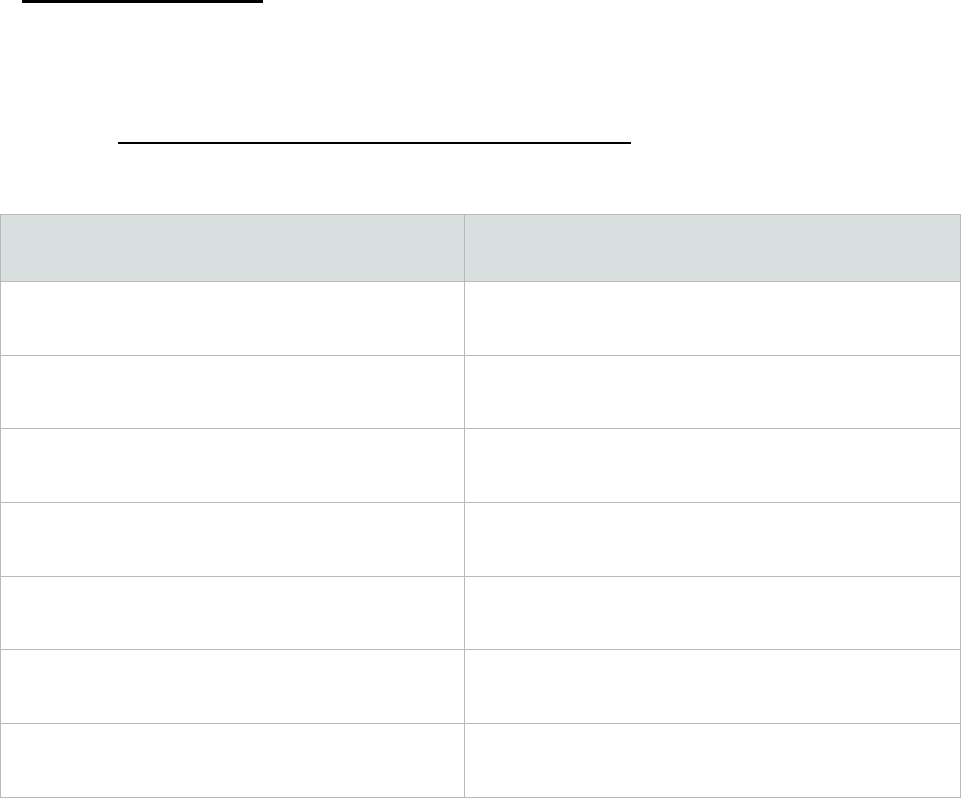
8. Monitoring arrangements
This policy will be reviewed and approved by insert name and role every number of years.
At every review, the policy will be shared with the governing board
Appendix 1. List of statutory policies and procedures for the EYFS
Statutory policy or procedure for the EYFS
Where can it be found?
Safeguarding policy and procedures
See child protection and safeguarding policy
Procedure for responding to illness
See health and safety policy
Administering medicines policy
See supporting pupils with medical conditions policy
Emergency evacuation procedure
See health and safety policy
Procedure for checking the identity of visitors
See child protection and safeguarding policy
Procedures for a parent failing to collect a child
and for missing children
See child protection and safeguarding policy
Procedure for dealing with concerns and
complaints
See complaints policy
